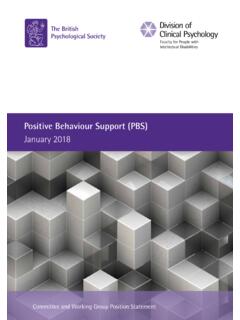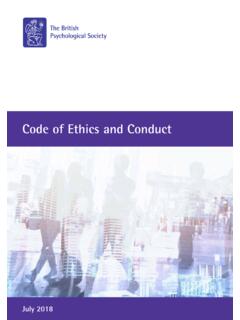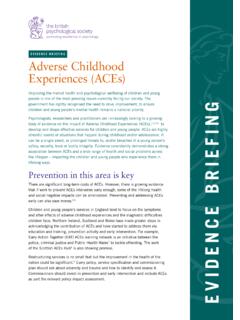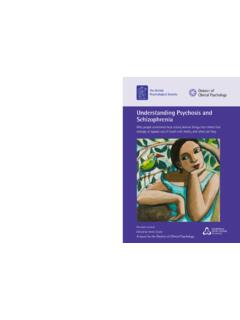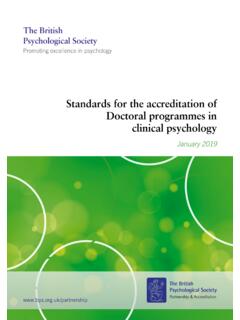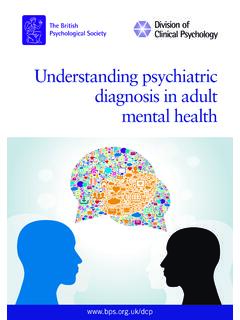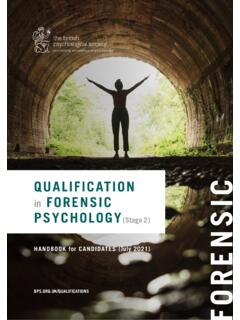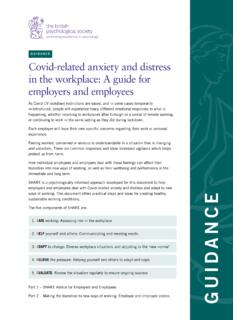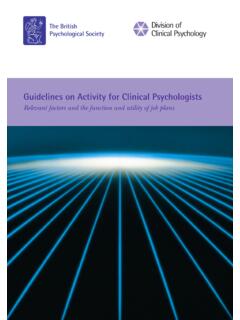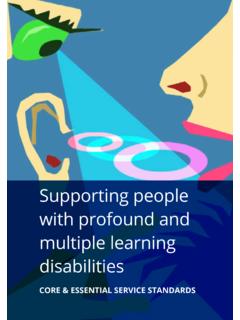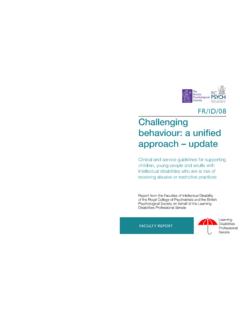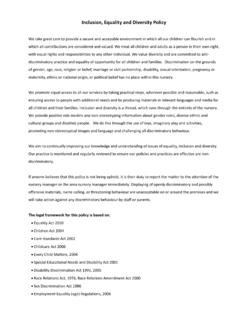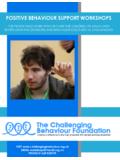Transcription of Challenging behaviour: a unified approach - BPS
1 Challenging behaviour: a unified approachClinical and service guidelines for supporting people with learning disabilities who are at risk of receiving abusive or restrictive practicesRoyal College of Psychiatrists, British Psychological Society and Royal College of Speech and Language TherapistsApproved by Central Executive Committee: March 2007 Due for review: 2012 College Report CR144 June 2007 Instead of responding to the person we typically react to the behaviour Most of what passes as assessment seems to be denial about the mutuality of our common condition Herb Lovett Our job is not to fix people, but to design effective environments Rob Horner Difficult behaviours are messages which can tell us important things about a person and the quality of his or her life David Pitonyak Royal College of PsychiatristsContentsMembership of working group 4 Acknowledgements 4 Foreword 5 Purpose of this report 6 Executive summary 9 Definitions and scope 12 Legislation 19 Focusing on the person 24 Capable environments 43 Creative commissioning 53 Future directions 56 References 60 Appendix: Good practice standards 664 of the working groupDr Roger Banks (co-chair, editor) Royal College of Psychiatrists Vice-President, Royal College of Psychiatrists, 17 Belgrave Square, London SW1X 8PG, email.
2 Alick Bush (co-chair, editor) British Psychological Society Psychology Services, St George s Community Health Centre, Winter Street, Sheffield S3 7ND, email: Peter Baker British Psychological SocietyJill Bradshaw Royal College of Speech and Language TherapistsDr Peter Carpenter Royal College of PsychiatristsProfessor Shoumitro Deb Royal College of PsychiatristsDr Theresa Joyce British Psychological SocietyProfessor Jim Mansell British Psychological SocietyDr Kiriakos Xenitidis Royal College of PsychiatristsAcknowledgementsThe working group acknowledges the help of the following people in providing their views, advice and contributions: Members of the learning Disability Faculties of the British Psychological Society and the Royal College of Psychiatrists, Vivien Cooper of the Challenging Behaviour Foundation and Helen Dorr of the National Family Carer College of PsychiatristsForewordI am very pleased to have been asked to write the foreword to this important publication.
3 One of the most important principles underpinning the Valuing People White Paper is that all aspects of the policy apply to all people with learning disabilities . Although we have made some good progress over the past 5 years, there is evidence that people with the most complex needs have not been benefiting as much as others from the changes in services, ways of working and, most importantly, culture and attitudes. This was neither the intention of the policy, nor is it a natural consequence of an initiative fundamentally concerned with people s rights as citizens and their place in society. To the contrary, it is arguably the extent of our success in meeting the needs of those who are most Challenging to support that should be the measure of our achievements. When I was managing services in London in the late 1980s and early 1990s, one of the most rewarding achievements was to see how people who had previously been written off by services could achieve a positive place in society (including paid employment) as a result of creative and courageous work by local staff (in partnership with the Special Development Team from what is now the Tizard Centre).
4 In this context, I particularly welcome the move to redefine the use of the phrase Challenging behaviour . The way in which that terminology has become a label to describe either a diagnosis or a problem owned by an individual has become an obstacle to the provision of appropriate and effective support. The real challenge to abilities and capacities is to those responsible for planning, commissioning, managing and providing services for people with such complex needs. It has been our historic failure to do that successfully that has resulted in people being excluded from mainstream society and segregated into inappropriate services. The acceptance of that ownership by ourselves rather than attributing the outcome to the individual s behaviour is an important step towards achieving better outcomes for all outcomes could and should include participation in all aspects of life and society. In order to do that, appropriate investment in skilled health professionals is an essential but not the only component.
5 If support to people who challenge services is interpreted as only being the business of the National Health Service, then achieving those wider goals and aspirations will be impossible. Partnership between all people concerned with the lives of people with learning disabilities and a shared vision to end the exclusion from mainstream society of people who are described as Challenging services is the only effective way forward. I hope that this document is widely used as an important contribution towards that GreigNational Director: learning Disabilities6 of this reportThis report is the result of a joint working group of the learning disability faculties of the British Psychological Society and the Royal College of Psychiatrists, in consultation with the Royal College of Speech and Language there are many good examples of integrated and multidisciplinary working between health professionals in the field of learning disability, there are often, in the background, dynamics that tend towards a splitting of professional groups and what then appear to be polarised and antagonistic views and approaches.
6 Yet, in the increasing joint working between the professions, it is clear that we share more common ground than we have differences and that our greatest effectiveness is when we work in close and coordinated of the main functions of learning disability teams in the UK is to work with people with a learning disability whose behaviour presents a challenge. Considerable resources of professional time, support, managerial planning, strategic thinking and research have been committed over the past two decades or more to the development of service responses to the challenges presented by a significant number of people with learning disabilities . Though effective responses are essentially multidisciplinary and involve a wide range of individuals including carers and families, it has tended to be the professions of clinical psychology and learning disability psychiatry that have taken the lead in the development of theoretical and clinical paradigms, models of service provision, planning, and is a growing interest in the concept of complexity in healthcare and it can be seen that Challenging behaviour presents a complex and often paradoxical entity.
7 The term was originally developed to describe the interaction between the behaviour of a person with a learning disability and the environment around them (see Chapter 3). Thus the term incorporates a multiplicity of biological and psychological characteristics, predisposing, precipitating and maintaining factors in the individual, the carers and the environment that cannot be conceptualised in terms of linear or simple cause-and-effect models. These multiple factors and the systems in which they operate are all interrelated and cannot be readily analysed or understood without reference to the others. New conceptual frameworks that incorporate a dynamic, emergent, creative, and intuitive view of the world must replace traditional reduce and resolve approaches to clinical care and service organisation (Elsek & Greenhalgh, 2001).One of the paradoxes in this complexity is the balancing of the need for consistent standards of evidence-based practice with an analysis and response to the unique circumstances and structures in existence for the individual at a particular point in behaviour: a unified approach7 Royal College of PsychiatristsIt is with these concepts in mind that this report has been produced, with the following aims.
8 To revise and develop the interpretation of the term Challenging behaviourto bring together relevant, available, evidence-based practice with a consensus of clinical opinion and experienceto provide a unified framework for good practice in multidisciplinary clinical and social interventionsto encourage the development of creative, flexible and effective responses to individuals who present behavioural challengesto provide guidance for service developers and commissionersto inform and empower service users and their carersto provide a set of standards of good practice against which service provision can be benchmarked and auditedto promote the development of comprehensive and effective local services and to reduce the number of individuals who are failed by the current service provisionto provide a framework for training of health and social care professionals and paid support staff and carersto guide future research and unifying principle is to improve the quality of life of people whose behaviour challenges the constraints of time and practicality it has not been possible to produce a report that addresses every aspect of Challenging behaviour across the whole spectrum of age and degree of learning disability.
9 Our main focus has been upon adults who are vulnerable to restrictive interventions and abuse as a consequence of their limited capacity to make choices for themselves about where they live or work, and how they are supported. Specifically we have not addressed the needs of children, older people or those who commit offences (forensic). We readily acknowledge that the issues for these groups are integrally related to the groups covered in this report; for example, behaviour that is severely Challenging in adults is likely to have its origins in childhood and early intervention to prevent Challenging careers is essential. There are, however, fundamental concepts and principles that are applicable to all population groups and the services that work with them. Not least, the core framework of creating capable environments as a response to Challenging behaviour is one that should be universal in this field. The needs of particular groups may be the work of further publications or of more localised responses to the guidance given in this report was produced through the combined work of the members of the working group and drew on a number of key publications already in existence or in preparation at the time; we have also carried out a wide-ranging consultation process (see Acknowledgements).
10 Although the disciplines of psychology and psychiatry were originally tasked to provide the main guidance for the working group focus and process, we have also sought the particular expertise of speech and language therapy, being aware that there is a body of professional research in this area. Challenging behaviour, however, requires a multidisciplinary and multi-agency approach and therefore this report has also been produced with the intention that it will be relevant and useful to a wide range of health and social care College Report CR1448 , family and paid carers, service providers and commissioners. In order to achieve its aims, this document needs to be alive, active and responsive. It is intended to provoke action as much as to inform, to encourage local and national debate, analysis, review and response. It aims to instigate further thought and guidance for the groups of people with learning disabilities whose needs are not addressed specifically in this , the report hopes to complement other publications and guidance in this area and overall to further a reinvigorated and unified approach to supporting people whose behaviour is experienced as Challenging .
